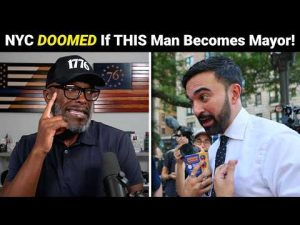As New York City faces yet another contentious mayoral election, the stakes couldn’t be higher. With the former Governor Andrew Cuomo locked in a tight race against Zohran Mamdani, a 33-year-old socialist, New Yorkers are about to make a choice that could spell disaster not just for their city, but for the entire country. Let’s be honest, folks—this isn’t just a local race. It’s a pivotal moment that could set the tone for America’s political future.
Andrew Cuomo, despite his deep flaws, represents the familiar face of the Democratic establishment, continually spouting the tired mantra that “diversity is our strength.” Meanwhile, his opponent, Mamdani, is the embodiment of progressivism run amok—a “rags to riches” tale of a political figure now trying his hand at the highest office in the city. But what exactly does Mamdani stand for? His vision for New York City sounds more like a recipe for economic meltdown than a roadmap to prosperity.
Mamdani’s platform includes the ludicrous proposal of city-owned grocery stores, aiming to undercut private supermarkets and yet completely ignoring basic principles of economics. This is New York, folks, not a socialist utopia. The idea of state-run stores is as laughable as turning your local grocery store into the DMV—efficient, smooth, and delightful, right? Price controls on staples like groceries might make Mamdani popular with those seeking quick fixes, but what he fails to grasp is that meddling with market dynamics doesn’t end well. We only need to look at history to see how this kind of economic tampering leads to shortages and breadlines.
Adding insult to injury, Mamdani’s infatuation with control doesn’t stop with produce. His promise to enact rent control across the city is equally misguided. Freezing rent might sound appealing to some, but it disregards the fundamental fact that landlords too are running a business. With low profit margins and high liability, who can blame them for closing up shop once the government steps in to dictate prices? If Mamdani’s policies come to fruition, the exodus of taxpayers to more rational states will only intensify, and New York will lose what little economic might it has left.
Perhaps the most jaw-dropping aspect of Mamdani’s platform is his proposed $65 million expenditure on transgender treatment, including services for minors. Prioritizing such initiatives over basic urban needs shows just how out-of-touch his campaign really is. The reality is, without the tax revenues of New York’s top earners—many of whom are already eyeing the exits—the socialist dream crumbles under its own untenable finances.
In a city where a significant portion of its residents weren’t born in this country, it’s intriguing to see how Mamdani, with his political background and scant political experience, wields influence. But one can’t help but question whether New Yorkers have a death wish, continually electing leaders who promise more destruction than development. When the glossy façade fades and reality sets in, will they recognize the grim future they voted for? In this race, the choice is clear: Rejection of socialist experiments that have failed time and again or embrace them and watch New York’s economy—with its unique vibrancy and dynamism—shrivel away.







